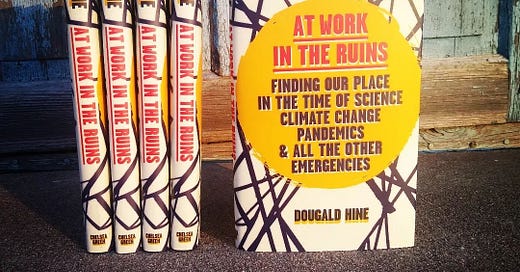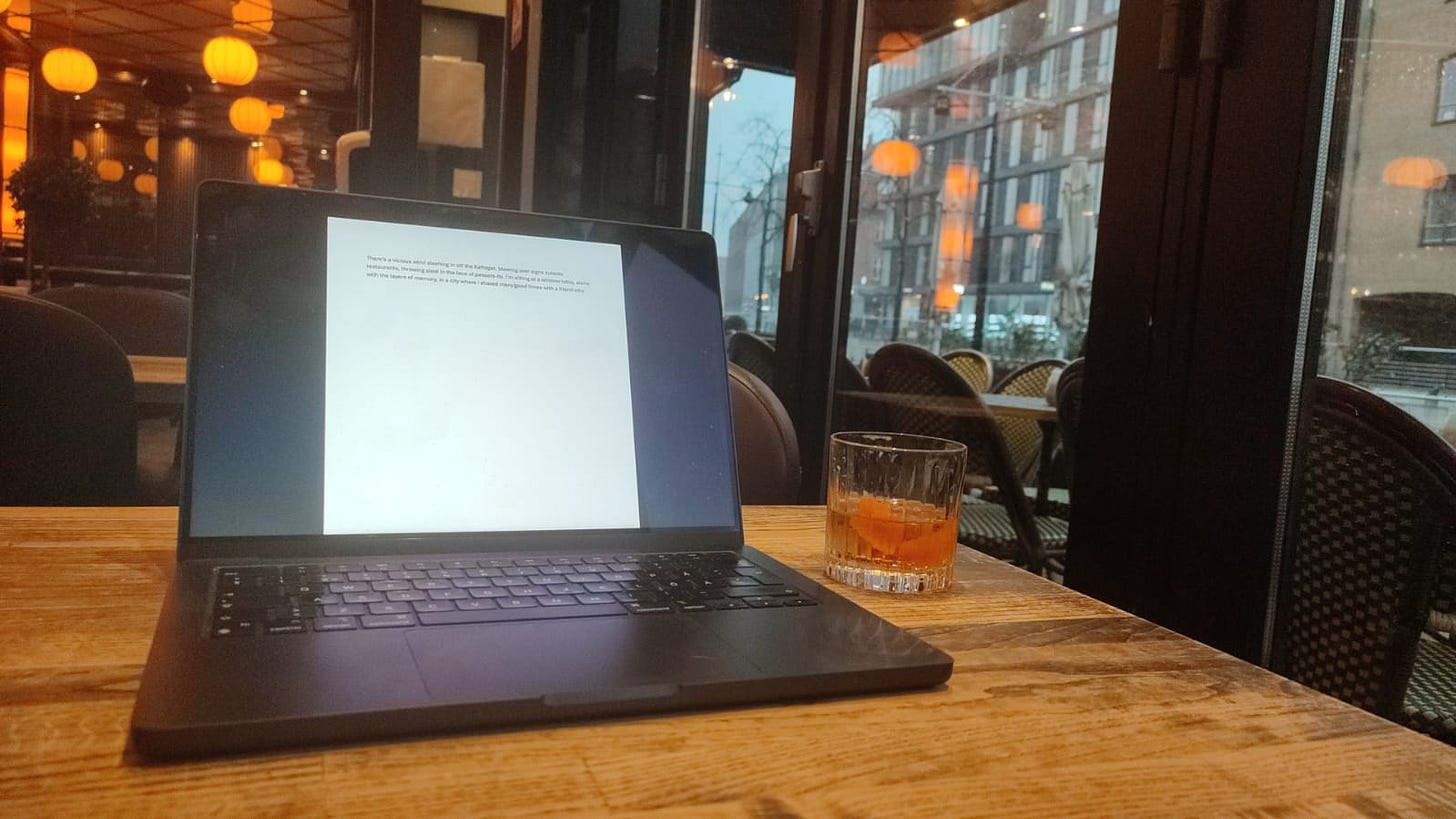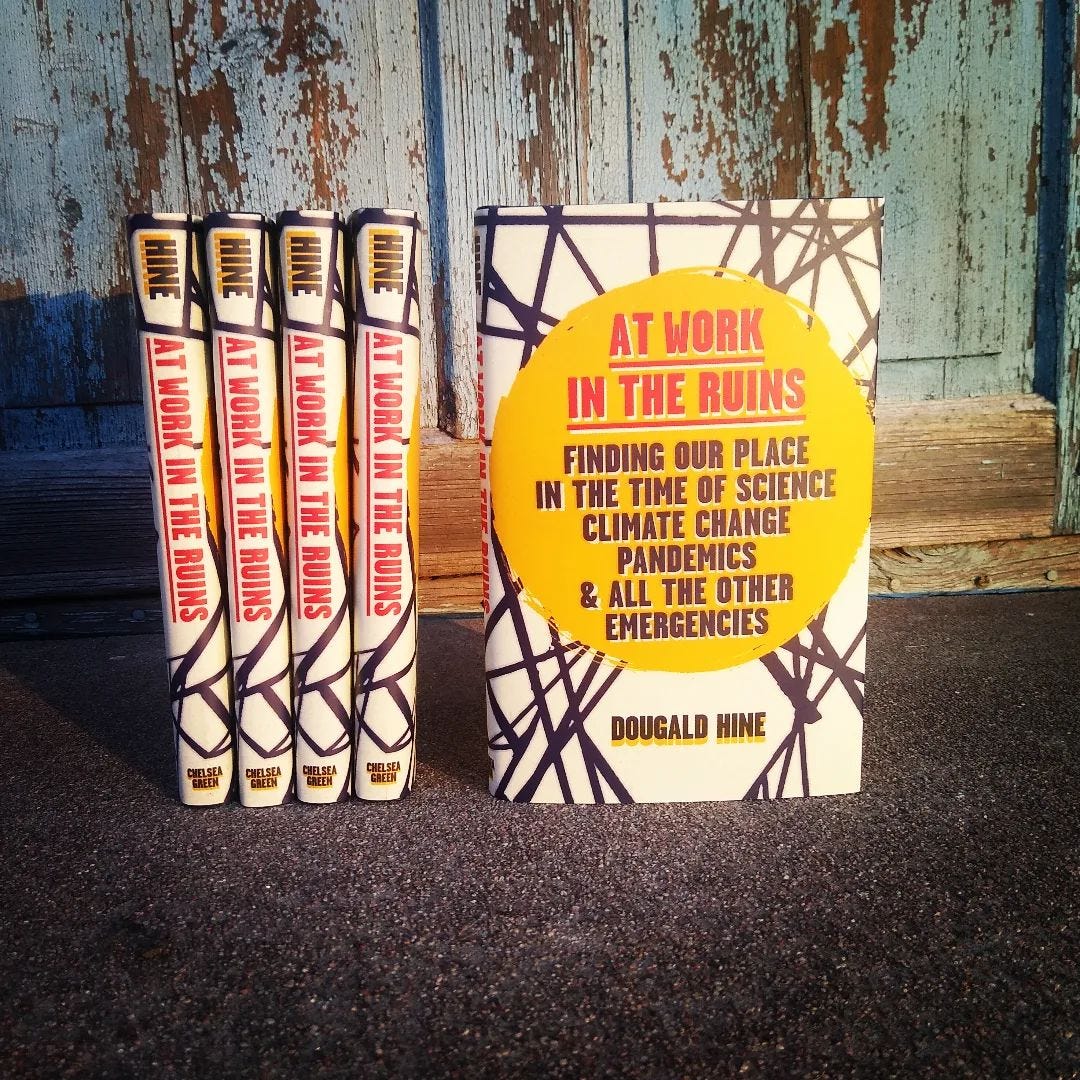There’s a vicious wind slashing in off the Kattegat, blowing over signs outside restaurants, throwing sleet in the faces of passers-by. I’m sitting at a window table, alone with the layers of memory, in a city where I shared good times with a friend who is no longer around. I didn’t see him in the years of his illness, so there’s nothing to stand between the memory of how he was seven years ago, on my last visit, and the improbable fact of his not being here now. There is a part of loss that only lands when you return to the place where someone ought to be.
I’ve been on the road this week, a short Danish tour that coincides with the end of a year of taking At Work in the Ruins out into the world. My journey with this book is far from over – I took part in another five podcast interviews in the past month, and there’s no sign of interest tailing off – but the anniversary of its publication offers a milestone from which to pause and look back.
The first thing that strikes me at this distance is what a tricky book it is to pin down. There’s no simple pitch, no obvious category in which to place it. I said to someone the other day, “I’m not sure I would read it, based on the description on the dust jacket.” I wasn’t entirely joking. Middle-aged white guy you probably haven’t heard of announces to the world that he’s no longer talking about climate change. OK, that’s not actually how the jacket copy reads, but you get my point.
This is no shade on my publisher, by the way – quite the opposite, I’m deeply grateful to Chelsea Green for putting their faith in this strange book, which is about so many things, and doesn’t fit into any of the neat boxes that often guide the decisions of the publishing industry.
Even after all the many hours of talks and interviews and public conversations over the past year, there are still parts of the book that I’ve hardly spoken about. There’s a whole section on the pandemic, which I think is one of the strongest parts of the book, but which almost never comes up in interviews. I’ll share some more about that material soon, in another post.
I’m struck, too, by the extraordinary things that people have said about the book. Like the review in the British Medical Journal, whose former editor compared it to “a poetic or a religious text [that] deserves multiple readings.” Or the philosopher who declared that, “If I wrote a book a year for 100 years I suspect I would never produce something as wise and kind or as well written as At Work in the Ruins.”
In those wildly generous words, there’s a clue to how the book is spreading and being shared and read – because, while it may not be amenable to the kind of three-sentence summary that makes for easy marketing, it is a book that matters to many of its readers, that strikes deep notes and makes them want to tell others, speaking about it with a warmth that sparks a curiosity in those they tell.
I know this because of the many messages I’ve had from readers over the past year. Like the woman who wrote two weeks ago to tell me how her son had put her onto the book, and now her builder friend was reading it, and he had passed it on to two therapist friends. As an author, it’s a gift to get these glimpses of the web of relationships through which a book is travelling, and to hear back from those for whom it is making a difference.
And today, returning to Aarhus after seven years, I spent the day teaching at the Kaospilots school. At the end of hours of rich, resonant, open-hearted conversations, the forty copies I’d brought with me had all been bought up by the students and staff, another mark of the hunger there is for the work that this book is doing.
So this is a thank you note, because I know that many of you reading this have been part of the web of conversations and connections through which At Work in the Ruins is spreading further and further, giving people language and images with which to make sense of the strange times in which we find ourselves. And it’s a note of curiosity, too, because having spent a year learning how difficult it is to sum up this book, I’d love to hear what you’ve found yourself telling people, when you encourage them to read it.
DH





That's a great question, Dougald. How I find myself talking about 'At work in the ruins' begins with the admission that the author is a friend of mine! From my own experience of him over time (even if all but a few hours of it has been through the screen) I can confidently say that the words in the book align themselves perfectly with the man. Intelligent, nuanced, humble, well informed and generous (there is at least a potential paragraph underneath each of those descriptors, by the way - they are not randomly generated!) I can also say that it is one of only 2 books I have ever begun again from the beginning immediately after the first reading. The other one was The God of Small Things by Arundati Roy. Go figure!
Happy bookaversary, Dougald. I don’t usually bother trying to summarize, other than to say I’ve studied with the author and this book is a miraculously concise and engaging summary of ideas we most need now. Rather than summarize, I thrust copies of it into people’s hands with “Read this; you’ll be glad you did.” Thank you for writing it. Time for a re-read.